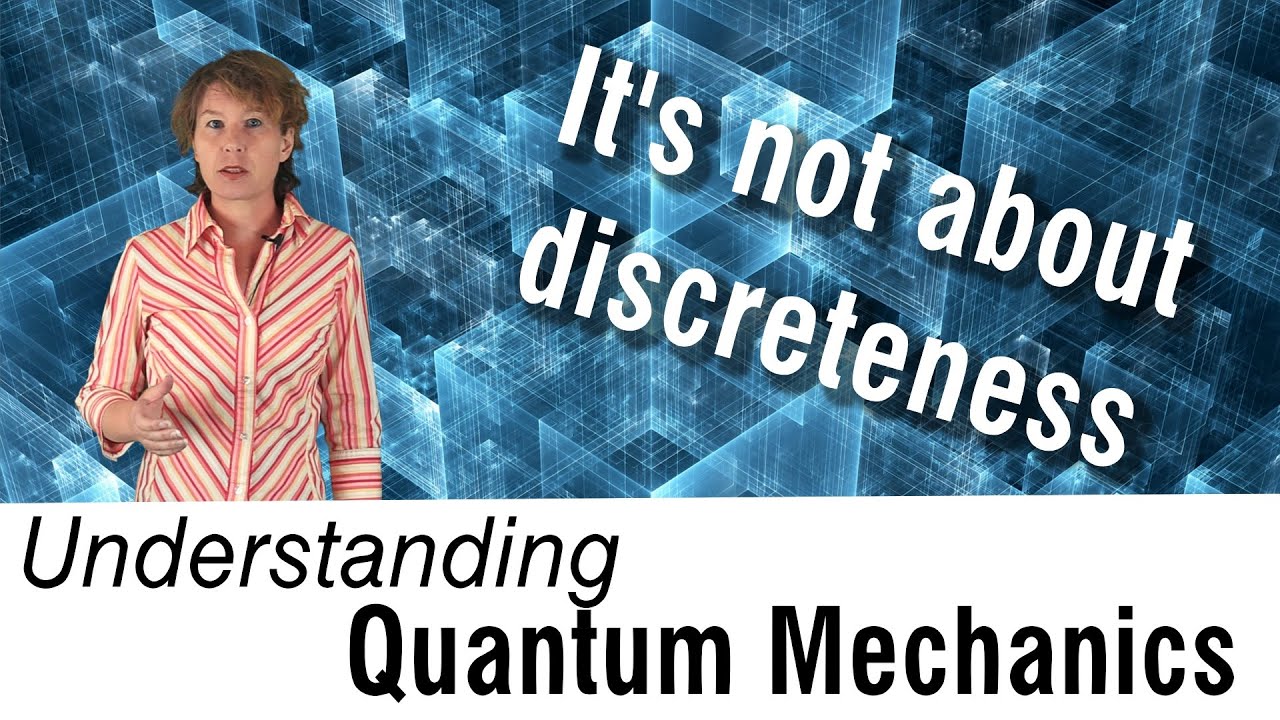Sabine Hossenfelder
This must be one of the most common misunderstandings about quantum mechanics, that quantum mechanics is about making things discrete. But is an understandable misunderstanding because the word “quantum” suggests that quantum mechanics is about small amounts of something. Indeed, if you ask Google for the meaning of quantum, it offers the definition “a discrete quantity of energy proportional in magnitude to the frequency of the radiation it represents.” Problem is that just because energy is proportional to frequency does not mean it is discrete. In fact, in general it is not.
Support me on Patreon: https://www.patreon.com/Sabine
Source




Its wonderful how Sabine calls this a "understandable misunderstanding". This is contrary to the typical practice by some on YouTube of calling people "idiots" and "morons" whenever they are wrong about something. Misunderstanding something does not mean someone has low intelligence. It just means that their knowledge base on that particular subject needs some enhancement.
Sabine is wrong. A photon CAN'T have any energy. Its energy IS descrete. A photon energy is planck energy multiplied by an intiger number.
In social science observables does not commute. Does this means social science are a kind of quantum theory too ?
I have no clue what you're trying to communicate. It's like you get halfway thru an explanation, then jump to something else
Thank you for your time and effort making these videos, quick question. In an atom is the field between the electrons and nucleus considered a quantum field?
The Brilliant course is of you, isn't it
Yes you are right Sabine, "energy is proportional in magnitude to the frequency of radiation it represent". And that proportional frequency of radiation starts from Hydrogen atoms and it reaches to the largest black hole known to human kind. You may ask why is that black holes do not emit radiation according to their size? You know Sabine when nucleus growing by size, it just reserving the energy using all the strength pull additional energy just to grow size wise, and that goes on as long as enough supply exits within the reach close by. AS soon as supply slow down or stops slowly but surely large nucleus in is way to become a planet or star, it start to emit radiation, in mean time slow energy movement toward the formation all energy or clouds of energy starting formations all close by after horizon, all formation after horizon expanding their own energy reach. Because main formation is more powerful pulling everything is noticeable to giant formation, with powerful pull of main formation robs most of the energy from small formation it turned them into rocks because main formation pulled so hard out of sadden new formations hot surface get covered with crust and scientists are losing track of this formations and have no clue what happened to them. after that planet size formations start to go self destruction, that is when they create lava and force volcanic activity over the surface of newly formed planets for stars it goes little bit to extreme instead of lava it goes total destruction of energy. The one we get heat form and we except as sun and main star .
Sabine, what is your opinion on Zlatko Minev's research and claims about quantum leap being "smooth" and continuous, not instantaneous? I.e. https://youtu.be/YZkZAScrSQM but there are a lot of articles about it online
the energy of a photon in empty space can not be half a Planck energy. energy is always discrete in terms of Planck energies. this was the origin of quantum theory by looking at black body spectrum.
Ma'am a pop question are you a human or a cyborg?
Quantum history, a classic…
https://www.youtube.com/watch?v=BFvJOZ51tmc
This video didn't age well, but that's also an understandable misunderstanding, since plenty of physicists don't seem to realize what Heisenberg's uncertainty principle actually says.
Imagine for a moment that space is continuously smooth and, thus, infinitely divisible. That means that the deltaX term in Heisenberg's inequality formula can be made infinitely small, and can then be defined as deltaX >= 0 (or, technically, 0+).
Consequently, for Heisenberg's inequality to hold true when deltaX = 0 (continuously smooth, infinitely divisible space), the other term, deltaP, would have to be infinitely large, which means that either particle's mass or its velocity would have to be infinitely large.
In other words, the only way to accurately (deltaX = 0) measure particle's position in continuous space is if that particle has infinite momentum (energy/potential)… and since we know that we actually can measure particle's position with reasonable accuracy (without its momentum going completely berserk), the whole argument really comes down to Zeno's paradox, or reductio ad absurdum.
What Heisenberg's uncertainty principle really says, therefore, is that space is discrete (quantized), putting (finite) lower bounds not just on the product of deltaX and deltaP, but also on each of them individually… which is perfectly obvious in the case of Planck length, with deltaX >= Lp by definition .
Quantum Mechanics is, indeed, all about discreteness (or quanta), but one of space itself, and not that — the usual understandable misunderstanding — of quanta of energy (inherited from the photoelectric effect).
To put it bluntly, Quantum Mechanics itself is only applicable in discrete spaces, and can't even work (as mathematical theory) in continuous spaces.
But.. what about flank constant?
If time is discrete, will Time Dilation then also be discrete?
As suggested in Loop Quantum Gravity.
Very informative. Thanks for sharing. Best wishes, Lord-Jesus-Christ dot
This is why it's silly to look for quantum gravity in that the quantum nature of mass gravity comes in singular discrete units as in neutron and proton but this particulate nature is not inherent to gravity. It's just mass units are a single photon trapped over own gravity and so are rather uniform. But non matter energy still imposes a curve, a lesser one by factor c^2 ish but not nothing. As energy density increases the self refraction of the wave increases until it has total internal reflection and becomes a drop of space. A mass unit.
Yes, photons can have any energy, but light does consist of photons. I think THAT is the discreetness people are thinking of there.
Sabine, care to know or not is currently irrelevant as I type this for I will say what I care to say none the less. As a wife (to and for me) you would not be good for me. But as a partner in some life endeavor you would be fantastic. Damn it, did I just quatumize sex? Really, if I had at least half a brain… ummm… ???
I try to understand Quantum Theory.
It says if you measure something it disappears.
I tried that.
I measured my wife.
I told her how fat and ugly she was.
She disappeared.
IT WORKS ! ! !
so the one thing I thought I understood about QM turns out to be not true. Quite humbling really. I thought that historically Max Planck stumbled on QM because he found that he needed to hypothesise that radiation is emitted and absorbed in discrete quanta if he was to correctly predict the spectrum of a black body and avoid the ultraviolet catastrophe.
WARNING: The limitations of QM: 1. It doesn't treat time and space the same way and therefore violates Special Relativity; 2. It can't explain the creation and destruction of particles; 3. It only deals with massive particles. That's why we needed Quantum Field Theory.
Is there any explanation to Why only some quantum states are allowed or is it just a model that aligns with experiments?
Is there a rigorous book about quantum physics which you recommend that shares your approach?
I graduated Math/CS and work as a programmer but interested in Quantum mechanics(and a bit about relativity).
I tried to do the MIT course online, but I didn't like their approach and it got me pissed off and stop after couple of lectures.
Considering that Schrodinger's equation is a differential equation, one can infer that at least some aspects of Quantum mechanics are not discrete.
What is the observation problem in quantum mechanics? Can you explain?
👍🏻
So mass is not quantized but like a photon can come in any amount? I presume this is due to relativistic effects. I mean the quantized mass of a proton in motion can appear to have any mass due to the equivalence of gravitational or rest mass and inertial mass. Right?
Could you please do a video on the contention between unitarity and relativity?